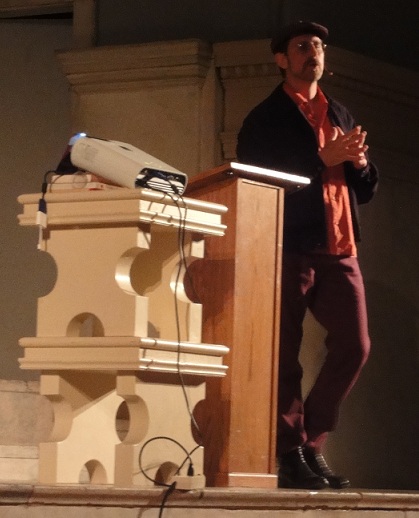“And Lo, I am with you always, even unto the end of the world,” were the words etched in stone behind the speakers at the recent “Horizons: Perspectives on Psychedelics” conference at Judson Memorial Church in New York City. And I will add that Christ Consciousness is especially relevant at the end of the world, when psychedelics dissolve the ordinarily stable confines of reality, and reveal one of underlying transcendent glory and truth. Here I will review the most important insights into the nature of the psychedelic therapy experience that were expounded by some very inspiring and peculiar researchers. Reality Sandwich was a media sponsor of this event.
Mathew Johnson and Mary Cosimano reviewed a promising pilot study on smoking cessation using psilocybin at Johns Hopkins University. Their methodology involved three different psilocybin sessions – for someone of 70kg they would use 20mg for the first experience, and 30mg for the second and third. They utilized Cognitive Behavior Therapy and guided imagery exercises to help patients quit smoking. Other techniques they mentioned were the use of scented oil to remind people of the cessation study, and the creation of mantras from the list of reasons to quit and be a non-smoker. The results were encouraging, but more trials with more patients are needed for more conclusive evidence. I hope they can continue this work and release the results and methods to other therapists for treating the public.
Claire Wilkins gave a wonderful talk on the results of 400 Ibogaine treatments for chemical dependencies at her clinic in Playas de Tijuana, Mexico called Pangea Biomedics. The addictions treated were numerous – Opiates, 76%; Stimulants, 32%; Nicotine, 26%; and 23% of all patients were experiencing depression, while 19% had PTSD. Ibogaine is a chemical extracted from the root of a shrub in Africa called Tabernanthe Iboga, where it is used by the Bwitists in Gabon for initiation rites. It’s a very long and intense trip, as I’ve been reading in the book Iboga: The Visionary Root of African Shamanism. It tends to allow a meeting with ancestors, spirits, and a review of not just one’s current life, but of past lives and collective or ancestral karma as well. Iboga’s use for the initiates, as well as in treating addicts, seems to be its property as a catalyst for recapitulating one’s former life, experiencing its death, and waking up to the possibilities of a new life in the ensuing rebirth. The visions, which are described more as waking dreams than hallucinations, may be integral to its use in stopping addiction; the rumor is that a synthetic derivative of Ibogaine, called 18-MC, does not produce visions, so it will be interesting to see if it has the same effect on addiction.
The one drug that has an astounding success rate at treating addictions, Ibogaine is ironically also a Schedule 1 substance, and would therefore officially have a high potential for abuse, with no medical value. Ibogaine’s efficacy is born out in the data: of the four hundred patients who left Pangea Biomedics, 92% were free from dependencies of choice, 6% were in mid-detox, and only 2% were untreatable, though it is not a magic bullet: 42% used their primary substance within 3 months, and only 18% stay free from their primary substance for 6 months or more. In conclusion, Ibogaine treatment is incredibly effective at interrupting serious addictions, but long-term support and additional treatments may be necessary. Above all, the most important factor is the patient’s desire to end their addiction. Whether used for chemical dependencies or spiritual growth, Ibogaine lets us do something I think we can all appreciate – in Claire’s words, it “helps us fall back in love with ourselves.”
One of the most anticipated researchers was Rick Strassman, who oversaw the administration of 400 doses of Dimethyltryptamine to 60 volunteers in a study at the University of New Mexico that finished in 1991. His recent research, however, was on the prophecies in the Hebrew Bible and their relation to the psychedelic state. He hypothesized that prophecy is the perception of “invisible worlds,” which are experienced under a “prophetic state of consciousness,” no doubt involving the endogenous release of DMT or its chemical relatives. DMT is, at least visually, the most powerful hallucinogen known to man, and tends to make “invisible worlds” visible and immediate. It is also synthesized naturally in the lungs and red blood cells. Strassman spoke of “history as fulfilled prophecy, end of days, and the messiah.” He also mentioned a passage in the Hebrew Bible which was particularly psychedelic, involving entities, which were frequently encountered by subjects in his DMT studies.
To my mind, Strassman’s idea of a prophetic state of consciousness, is spot-on – if linear time is an illusion, as the Buddhists say, and the only true reality is the eternal now, then when people contact this singular, ever-present moment, especially through psychedelics, both past and future are available to be seen, experienced, and written about. Could psychedelics be vehicles to time travel and to experience the “Christ Consciousness” in our future? I believe they are, because our future (from the perspective of linear time) rests within the singularity, that constantly-creating Omega Point, and source from which all space-time arises. To quote Peter Russell, “Within a finite time, we could taste infinity.” The reveal-ation at the end of the age (or end of time) is simply the uncovering of the true Self, the divine light of consciousness, the eternal Spirit behind the fleeting mask of shadow, ego, and matter. Many have foretold that such a revelation would come, and many more have already experienced this truth, through both mystical contemplation and psychedelic catalysts.
But do they all believe what their eyes have seen when back in ordinary reality? Clearly the answer is no, as the next day’s speaker JP Harpignies would say: “We need to stop the silliness…utopia isn’t going to happen.” The abstract of his talk said he would “Explore one troubling aspect of psychedelic subcultures – a fairly widespread tendency toward the uncritical acceptance of a number of extremely naive utopian ideas….” I will admit that the psychedelic experience, when fully embraced, is one of empowerment, hope, and the ultimate perfection of all things. If utopian is the worst epithet one can call such an inspired subculture, then I see no reason why we can’t live up to the hype and create a spectacular world of dreams and visions!
The realization of a utopian paradise will come in large part when the general populace starts to embrace the psychedelic experience, which many of these researchers are helping to promote and legitimize. Not all, however, believe these particular catalysts should be given such a wide audience. Jeffrey Guss, Director of Psychedelic Psychotherapy Training for the NYU Psilocybin and Cancer Anxiety Research Project, took the hard line and said that they should not be “part of, or available to the mainstream,” while Mathew Johnson of the smoking cessation study added, “psychedelics are not for everyone.” To my pleasant surprise, Neal Goldsmith on the other hand, “takes exception” and thinks that they should be, and will be available, because of the widespread the fear of death (and I would add the basic questions of reality and existence). Psychedelics have been found to be tremendously helpful in reducing one’s fear of death, because, I would argue, they allow one to experience it and see that there is beauty, perfection, and eternal consciousness on the other side. Neal thankfully presented the optimistic position that everyone has the ability to recognize their divine nature and true Self by coming face to face with God. The knowledge that the catalysts for such a powerful mystical experience are now available should not be cloistered away in esoterica or academia, but should be brought forth and exposed as the precious gifts to mankind that they truly are.
One individual who I think gave psychedelics the respect they deserve was the poet and explorer of plant consciousness, Dale Pendell, author of the Pharmako trilogy. When the subject inevitably came up of how Timothy Leary and the gurus in the 60s had ruined psychedelic research by promoting it to the mainstream, Dale countered by saying that it was really those that stayed quiet in their ivory towers that were the irresponsible ones – society was sick and it needed strong vision (sound familiar?). He also spoke about entities, giving them a status of somewhere between an I-Thou relationship. They can have a “playful, irreverent attitude,” he said, “especially with the tryptamines.” He even gave some instruction on channeling entities through glossolalia or speaking in tongues: hold a space for them and let it come out! The message from the entities was, “Blessings from the Universe, for all!” I can confirm such heartfelt messages from hyperspace. Finally, Dale challenged the audience to go further, by saying, “The earth is crying for a deeper and more radical cure [than the conventional research path will allow],” so, “why not try to use psychedelics for helping the transformation of people and helping the earth?”
Erik Davis, prolific author and journalist of visionary culture, struck a similarly irreverent note. He pointed out that the 2006 psilocybin study on mystical experiences by Johns Hopkins was in a way a move toward secularizing and materializing a profoundly spiritual experience. The study found that roughly two-thirds of participants had a mystical experience, and yet, Erik said, “We already knew that.” These experiments had already been done in the 60s and it was just going over well-worn territory. “The research model is not sufficient,” he echoed Dale, “Neurology is on a collision course with the full-on DMT experience.” A favorite metaphor of his was the mobius strip, where one side always leads to the other, culminating in his exhortation to the reserved researchers, “To take it seriously, you have to take it!” I would have liked to hear a retort from the academics on that one!
Yet another mobius strip metaphor was the tension between the modern rediscovery of psychedelics as both leading to the reduction of spiritual experiences as simply chemical or material interactions in the brain, while also bringing back the power and immediacy of direct experience to religion. Speaking of the basis for religion, he also noted that many people, probably some in the audience, subscribe to the idea that Jesus was really a mushroom, a view he would neither promote nor deny. While I agree that seeing religion as simply a product of ecstatic or mystical experiences induced by mushrooms leads to a subtle reductionism, there is a great deal of evidence for the use of mushrooms in Christianity, contrary to JP Harpignies’ quip that there is “no evidence of cultural use of mushrooms,” citing Andy Letcher’s much discredited book, Shroom. The evidence I cite is simply Jan Irvin’s exhaustive book on the subject, The Holy Mushroom: Evidence of Mushrooms in Judeo-Christianity, which has fresco after stone carving of mushrooms in 9th through 12th century European cathedrals, mainly depicted by the red-capped Amanita mushroom as either the fruit of the tree of knowledge, or the tree itself.
I think the evidence is clear of an esoteric current within Christianity that used mushrooms, but what about the figure of Jesus? The most reasonable explanation I’ve found is that Jesus was a person deeply transformed by the mushroom, and thus he tended to speak from the point of view of en-light-ened mushroom consciousness. For example, in John 6:56 of the King James Bible, it says, “He that eateth my flesh, and drinketh my blood, dwelleth in me, and I in him.” Christ consciousness dwells in those who have eaten the flesh of the mushroom, or drank the Amanita wine, his blood. Anyone familiar with the teachings of mushrooms, especially of the psilocybin variety, will easily identify the teachings of Jesus as being one and the same. According to saying 113 in the Gospel of Thomas, arguably the most accurate and unadulterated of all transcripts, “His disciples said to him, ‘When will the kingdom come?’ It will not come by watching for it. It will not be said, ‘Look , here it is,’ or ‘Look, there it is.’ Rather, the Father’s kingdom is spread out upon the earth, and people do not see it.” In other words, mushrooms cleanse the doors of perception and reveal the living beauty and perfection of the world as consciousness. There is no need to follow dogma or ideology to find heaven; rather, the transcendent is also the immanent, for those who have eyes to see. Saying 77: “Jesus said, ‘I am the light that is over all things. I am all: from me all has come forth, and to me all has reached. Split a piece of wood; I am there. Lift up a stone, and you will find me there.” The divine nature of all things is revealed under Christ, or rather mushroom consciousness. Finally, both of these teachers have much to say on the nature of existence and time. For example, John 6:54 says, “Whoso eateth my flesh, and drinketh my blood, hath eternal life; and I will raise him up at the last day.” When you take mushrooms you experience the death of the ego, and re-awaken to the reveal-ation of the underlying Christ consciousness, the spirit behind matter – you see that what you truly are is eternal, and will always be resurrected at the last day, or the end of time, or when you awaken in the eternal Now. To follow the metaphor of Erik Davis’ mobius strip, the evolution of matter will always return to the domain of spirit, and psychedelics are leading the way.
They have found a great proponent in the conference organizer and psychologist Neal Goldsmith, who points the way forward to a neo-tribal society, where we will return to our underlying wholeness and unity with nature and the kosmos. His lucid and inspiring vision can be found here: “Fusion of Spirit and Science“. Neal believes that psychedelics, when used appropriately, will play a huge role in transforming the “corrosive nature of the psyche.” Indeed, they have already been instrumental in the psychospiritual development of millions around the world and throughout history.
But it is now, as we step out of history and into the imagination, that we need them the most. I believe it is no accident that the very tools we need for our transformation are just now becoming available. Specifically, the transdimensional vehicle that is DMT, and its methoxylated cousin, the sacrament 5-MeO-DMT, are the most powerful entheogens the human race has ever known. They have been given to us by the plants, but they are also produced endogenously inside the body of every living human being. Their power to reveal the mysteries of the universe and the true nature of reality is unparalleled. It is with these sacraments and catalysts that we will find both the future of psychedelic research, and the final fulfillment of mankind’s kosmic destiny.
Resources:
Horizons: Perspectives on Psychedelics Conference
http://www.horizonsnyc.org/site/
Rick Strassman
www.rickstrassman.com
Dale Pendell
www.dalependell.com
Erik Davis
www.techgnosis.com
Pangea Biomedics Ibogaine Treatment
http://www.pangeabiomedics.com/
Johns Hopkins Psilocybin and Mystical Experience Study
http://www.hopkinsmedicine.org/press_releases/2006/07_11_06.html
DMT: The Spirit Molecule Documentary
http://thespiritmolecule.com/
Books:
Iboga: The Visionary Root of African Shamanism by Vincent Ravalec, Mallendi, and Agnes Paicheler
The Holy Mushroom: Evidence of Mushrooms in Judeo-Christianity by J.R. Irvin
Jedi Mind Traveler is an explorer of the mysteries, seeking collaboration on projectsthat create mind manifesting environments with immersive video, audio,and tactile feedback. He is interested in the many ways of amplifying subtle energy,entering the realms of the psyche, and peaking behind the wiring of reality. He hopes to work on progressively larger events, where sacred space iscreated with ritual, ceremony, technology, and where many novelintegrations of creative energy and exploration can unfold. Check out his Evolver blog.
Horizons poster courtesy of Horizons NYC. Photograph of Erik Davis courtesy of Nese Senol.















